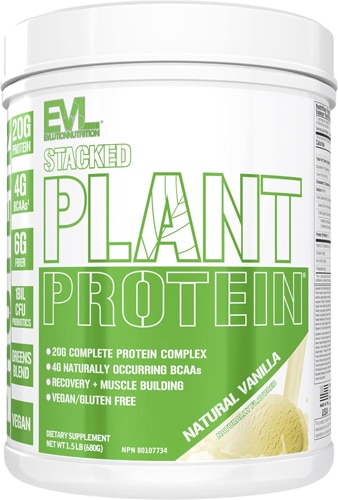[vc_row][vc_column][vc_column_text]Though your thirties may seem early to start thinking about aging, the decisions we make in midlife can have a big impact on how we feel in our 60s, 70, 80s and beyond. Want to be an active, energetic octogenarian? Make choices now that will prolong your
healthspan and
slow down your biological clock.
One key area to consider: The connection between protein and preserving muscle mass in later life.

Protein and aging: Why does it matter for longevity?
While
protein is important at every stage of life to support basic body functions like cell growth and repair, in our later years how much we consume matters even more. Because protein is necessary for building the cells of our muscles and bones, we need it to maintain critical muscle and bone mass.
According to
James McKendry, Assistant Professor of Nutrition and Healthy Aging at the
University of British Columbia Vancouver, “As part of the aging process, our muscles become less sensitive to the stimulatory effects of the protein we consume, and we’re less able to use the protein we ingest to synthesize skeletal muscle.” As a result, he says, “Older adults need to consume considerably more protein at each meal to elicit the same muscle-building response” you’d see in a younger person.
With every passing year, if we don’t actively work to protect it, we lose between one and three percent of our muscle mass. While that may not sound like much, year after year that adds up to a lot of lost muscle, in some cases as much as half by the time we reach 80. As we get older, not having that muscle to help us perform daily tasks makes them much more difficult to do, whether it’s bending to pick something up or safely navigating stairs.
Some research suggests that this
muscle loss (known as sarcopenia) has
metabolic and hormonal effects that contribute to other age-related conditions, such as insulin resistance and rheumatoid arthritis.
“As we age,” McKendry explains, “repeatedly failing to consume sufficient protein daily accelerates the rate at which older individuals’ muscles get smaller and weaker.” Combined with an increased risk of developing cardiovascular disease, diabetes and dementia, he says, low protein consumption “may condemn older individuals to physical dependency much earlier.”
Additionally, studies suggest that
higher protein consumption may have a protective effect on bone mass. Similar to the mechanisms that use protein to build muscle cells, our bodies need protein to maintain our bone density, which helps make injuries like hip fractures less likely.
While
strength training is vital for maintaining and building muscle, without sufficient protein, we don’t have the building blocks to make muscle cells.
However, it’s important to understand that protein intake alone won’t protect muscle mass if you don’t use and challenge your muscles. Getting sufficient
protein combined with resistance exercise appears to be the best way to maintain and build muscle.
To avoid frailty in later years, preserving our muscle mass in midlife is crucial. McKendry advises adopting muscle-building habits like resistance training and sufficient protein consumption as early in life as possible, well before age-related declines become an issue. “The earlier you start making good healthy decisions, the better,” he counsels. “It’s much easier to maintain than fix something that went wrong later on.”
How much protein do we need?
While the USDA Recommended Dietary Allowance lists just .8 grams of protein per kilogram of body weight, experts in protein and aging point out that this number is the minimum believed necessary to prevent protein deficiency diseases in younger individuals, not an ‘optimal’ amount to strive for.
Because our ability to use protein for building muscle decreases with age, researchers looking at preserving muscle in older adults suggest aiming for
1.2 grams per kilogram of body weight. Using this formula, someone weighing 150 pounds needs roughly 82 grams of protein daily.
Research suggests that spreading our intake of protein over the course of the day rather than consuming most of it in one meal has benefits for building and maintaining muscle. A 2014 study found that even distribution of protein throughout the day led to
25 percent greater muscle protein synthesis as compared to the more common pattern of little protein at breakfast and ample protein at dinner. However, notes McKendry, “The timing of the protein is far less important than the quality and the total amount.”
What types of protein are best?
Though most people think of meat-centric meals when they consider trying to increase their protein intake, research suggests that if increased healthspan is your goal, plant-based proteins are preferable.
Valter Longo, a leading longevity researcher at University of Southern California’s Longevity Institute, recommends avoiding most animal proteins, which are associated with increased risks of heart disease, cancer and all-cause mortality when compared with plant-based sources of protein in large population-based studies. A 2016 study of over 130,000 participants found that "high animal protein intake was positively associated with cardiovascular mortality and
high plant protein intake was inversely associated with all-cause and cardiovascular mortality, especially among individuals with at least one lifestyle risk factor.”
Getting adequate protein from plants isn’t as challenging as some people believe. The myth that you need to be careful to combine “incomplete”
plant proteins has long since been debunked. While some essential amino acids are present in lower amounts in certain plant foods, consuming larger quantities of a variety of protein-rich plants generally addresses this issue.
One
amino acid that plays an especially important role in muscle synthesis is leucine, which is believed to act as a
‘trigger’ for muscle protein synthesis in older adults. Leucine is found in meat and dairy, as well as in lesser amounts in legumes, seeds, and grains. Whey protein is considered especially useful for addressing inadequate protein intake in older adults, as it’s exceptionally high in leucine. Those avoiding dairy can find it in lower but still substantial amounts in lentils and beans, as well as protein powders derived from peas and soy.
Creative ways to get more protein
Something to consider if you’re trying to increase your protein intake: Adding protein to meals that tend to be lower in protein, particularly breakfast, as well as dinners centered around lower-protein staples like pasta.
Many common breakfast foods tend to be heavy on carbs and light on protein. Try to avoid high-sugar, low protein breakfasts featuring foods like processed cereals, pastries, or pancakes, and work in
more protein at breakfast. As an added bonus, you’ll lessen
spikes in blood sugar, which offers a slew of additional health benefits.
High-protein breakfast ideas
Pack in some extra protein with lunch
High-protein snacks
Snacks are another opportunity to get some extra protein. Some
protein-packed snack options include roasted
edamame,
lupini beans,
almonds, or homemade
energy bites.
Check out these other
protein-rich snacks for more inspiration.
Protein-rich dinner recipes
While meals featuring
fish or
chicken will generally contain ample protein, you can up the protein content of
meatless meals by choosing some top
vegan protein sources.
Legumes, like
lentils or
black beans, and
tofu are especially versatile for making hearty and satisfying dinners. Some recipes to try:
Red Lentil Soup
Stir Fried Sesame Tofu
Quinoa Black Bean Salad
Vegan Enchiladas
Sheet Pan Tofu and Veggies
If you’re planning a quick pasta night, try using a high-protein
pasta made with chickpeas,
edamame, or
red lentils in place of wheat pasta.
High-protein desserts
Even treats and desserts can let you sneak in a little extra protein. Try baking with protein-rich
chickpea flour, or whip up a batch of
black bean brownies.
Some other sweet treats to try:
Chocolate hemp nice cream
Pumpkin spice protein bites
High protein ice cream sandwich
Interested in being one of those admirably active and healthy elders? Make it a priority now to get plenty of quality protein and muscle-building exercise each day. The habits you build now can help you maintain muscle and vitality for years to come.[/vc_column_text][/vc_column][/vc_row][vc_row][vc_column][vc_text_separator title="Featured Products" border_width="2"][vc_row_inner equal_height="yes" content_placement="middle" gap="35"][vc_column_inner width="1/3"][vc_single_image image="183348" img_size="full" alignment="center" onclick="custom_link" img_link_target="_blank" css=".vc_custom_1743000880166{padding-right: 7% !important;padding-left: 7% !important;}" link="https://www.vitacost.com/seapoint-farms-organic-edamame-pasta-fettucine"][/vc_column_inner][vc_column_inner width="1/3"][vc_single_image image="183349" img_size="full" alignment="center" onclick="custom_link" img_link_target="_blank" css=".vc_custom_1743000898638{padding-right: 7% !important;padding-left: 7% !important;}" link="https://www.vitacost.com/sprout-living-simple-protein-organic-pea-protein"][/vc_column_inner][vc_column_inner width="1/3"][vc_single_image image="183350" img_size="full" alignment="center" onclick="custom_link" img_link_target="_blank" css=".vc_custom_1743000912904{padding-right: 7% !important;padding-left: 7% !important;}" link="https://www.vitacost.com/vega-protein-and-greens-vegan-plant-protein-powder"][/vc_column_inner][/vc_row_inner][/vc_column][/vc_row]





